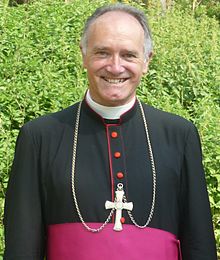Bernard Fellay
Swiss bishop
Bernard Fellay (12 April 1958 –) is a Swiss bishop and former superior general of the Traditionalist Catholic priestly fraternity Society of Saint Pius X.

Quotes
edit- We have souls to save. The Church is not new. If we follow what the Church has always done, and what the saints have always done, we are assured of being on the safe path to Heaven. In all times, the Church has considered novelties dangerous and the fruit of pride. We might, today, say that there is a sickness for novelty and change. But God does not change. The Faith does not change. The Commandments do not change. Be faithful to what the Church has always taught in her catechisms and you will be assured of being on the right side of this fight for God and His glory.
- Interview: Bishop Bernard Fellay on The Fatima Centenary & Church Crisis (February 8, 2018)